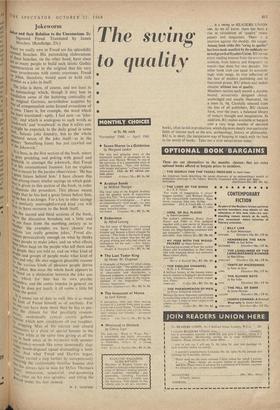Jokeworm
Ickes And their Relation to the Unconscious. By Sigmund Freud. Translated by James Strachey. (Routledge, 25s.) WHAT we really owe to Freud are his splendidly seminal hunches. His painstaking elaborations of these hunches, on the other hand, have since led so many people to build such idiotic Gothic superstructures on to the original that his very 114ole reverberates with comic overtones. Freud °I1 jokes, therefore, would seem to hold rich Promise as a joke in itself. jlic joke is there, of course, and not least in "le terminology which, though it may lose in translation some of the battering comicality of the crig :inal German, nevertheless acquires by lisaYoW_ofn,compensation some fecund evocations of h There is, for example, the word which has been translated-aptly, I feel sure-as 'joke- , (irk,' and which is analogous to such words as `Nw nic' and 'woodwork' in that it refers not, rilight be expected, to the daily grind in some ;l4ruke,tuSriatanic joke foundry, but to the whole Ph 11 nexus of the joke itself--as in the ra'e: 'Something funny has just crawled out Of it. e l) .c lkework.'
b it is here, in the first section of the book, where e goes prodding and poking with pencil and h i"°tebeok in amongst the jokework, that Freud as his unintentional funniest. Let me explain what is meant by the jocular observation: 'He has t great future behind him.' I have chosen this r°111 among many similar sayings on which guid- an„ ' is given in this section of the book, in order 4/ illustrate the procedure. This phrase means butPIY :hat he has had a great future before him,
.
of has it no longer. For a key to other sayings
' a similarly unstraightforward kind you will have to have recourse to the book itself. In the second and third sections of the book, Where W„ the discussion broadens out a little and ' are freer from the numbing anxiety as to are ' 'the examples we have chosen' for !II°1Ysis 'are really genuine jokes,' Freud dis- s 0 'se provocatively enough on what he thinks the,7eople to make jokes, and on what effects these jokes have on the people who tell them and h„,.'e People they are told to, and on what kind of Niple and groups of people make what kind of link„„ and why. He also suggests plausible reasons fc'r the various kinds of pleasure people derive hrcirn jokes. But. since the whole book appears to b lekas c:c1 on a distinction between the joke qua Nhich for him has its own psychic xhie rInnibra, and the comic impulse in general, on belln doe not touch, it all seems a little bit w'e the point. th ifit seems out of date as well, this is as much fault of Freud himself as of anybody. For par p can have done more than he has to pre- ,gire „ the climate for that peculiarly contem- PceItry, 1, sardonically cynical cosmic gallows 1;.,tilicInr which now conditions all our laughter, by striPPing Man of his. ancient and absurd rein_s ;ions to a place of special honour in the cue tose while at the same timc giving us all thc iteo bash- away at its mysteries. with spanner ha monkey-wrench like some dementedly slap
pp,
bomb-disposal squad dismantling a land-
.in, 4,' And what Freud and DarWin began. re,.,, 11 carried a step farther by surreptitiously St h; LS the comfortably -familiar banana skin 11,. LS. always lain in wait for Dylan Thomas's ki,10,`, censoious. senatorial, soul-possessing f/to,..c2'reel on his two spindles,' and tilting the "" I under his feet instead.
N. F. SIMPSON


















































 Previous page
Previous page